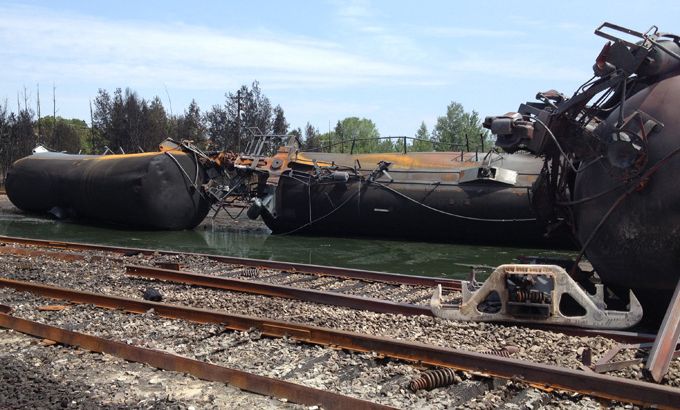Criminal probe into Canada train disaster
Police open investigation into deadly derailment in Quebec as dozens of bodies remain buried in ruins.

Canadian police have opened a criminal probe into a fatal oil train blast in the town of Lac-Megantic, following claims and counter claims by operators and firefighters over the causes.
Police also raised the death toll from Saturday’s blast to 15 from 13 on Tuesday and said the total number of dead and missing people had also risen to 60 from 50.
Keep reading
list of 4 itemsEurope pledges to boost aid to Sudan on unwelcome war anniversary
Birth, death, escape: Three women’s struggle through Sudan’s war
Mapping Israel-Lebanon cross-border attacks
Quebec police inspector Michel Forget told a news briefing that investigators have “discovered elements” that have led to a criminal probe. “Criminal negligence might be one of the leads we are looking at,” he added.
The inspector ruled out terrorism.
Blackened debris, twisted metal and gas leaks have hampered the search for perhaps dozens of bodies after the runaway oil train smashed into the small lakeside town and incinerated much of its downtown.
|
|
| Canada train crash scars small community |
Investigators zeroed in on whether a blaze on the train a few hours before the disaster set off the deadly chain of events.
“This is a very risky environment. We have to secure the safety of those working there. We have some hotspots on the scene. There is some gas,” said Benoit Richard, a Quebec police sergeant.
He said recovery efforts had to be halted briefly for health reasons on Monday, and some officers had to be removed from the scene, but did not elaborate.
The bodies that have been recovered were burned so badly they have yet to be identified.
The Montreal, Maine & Atlantic Railway train broke loose early on Saturday, speeding downhill nearly 11km and jumping the tracks at 63mph in Lac-Megantic, near the Maine border, investigators said.
All but one of the 73 cars were carrying oil and at least five exploded.
The blasts destroyed about 30 buildings, including the Musi-Cafe, a popular bar that was filled at the time, and forced about a third of the town’s 6,000 residents from their homes.